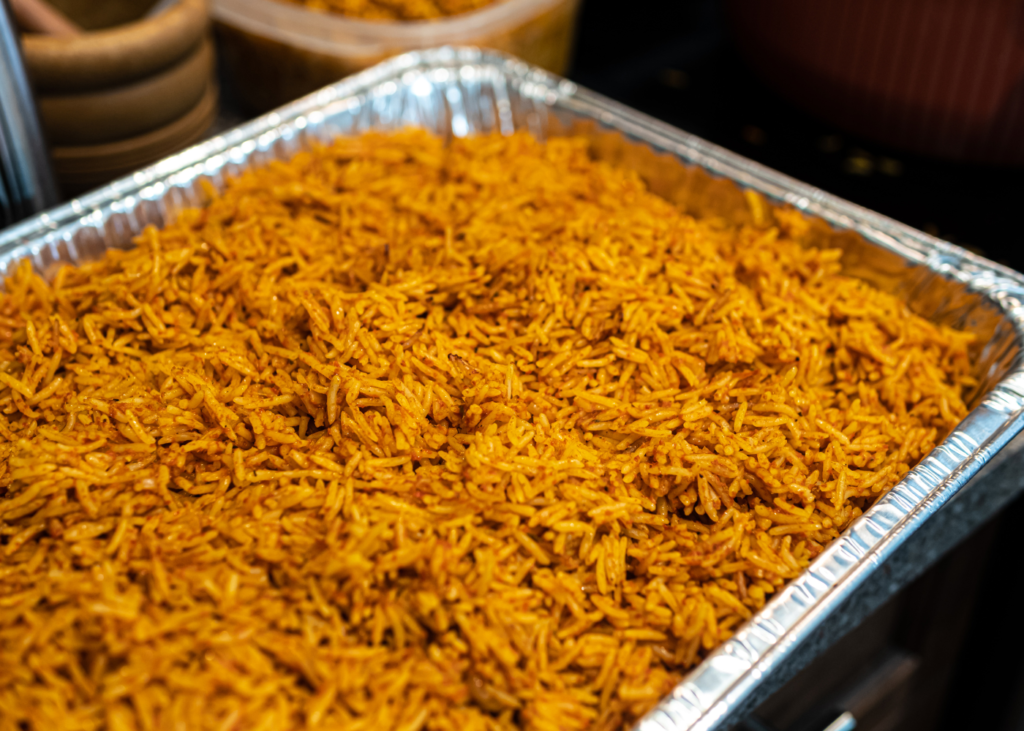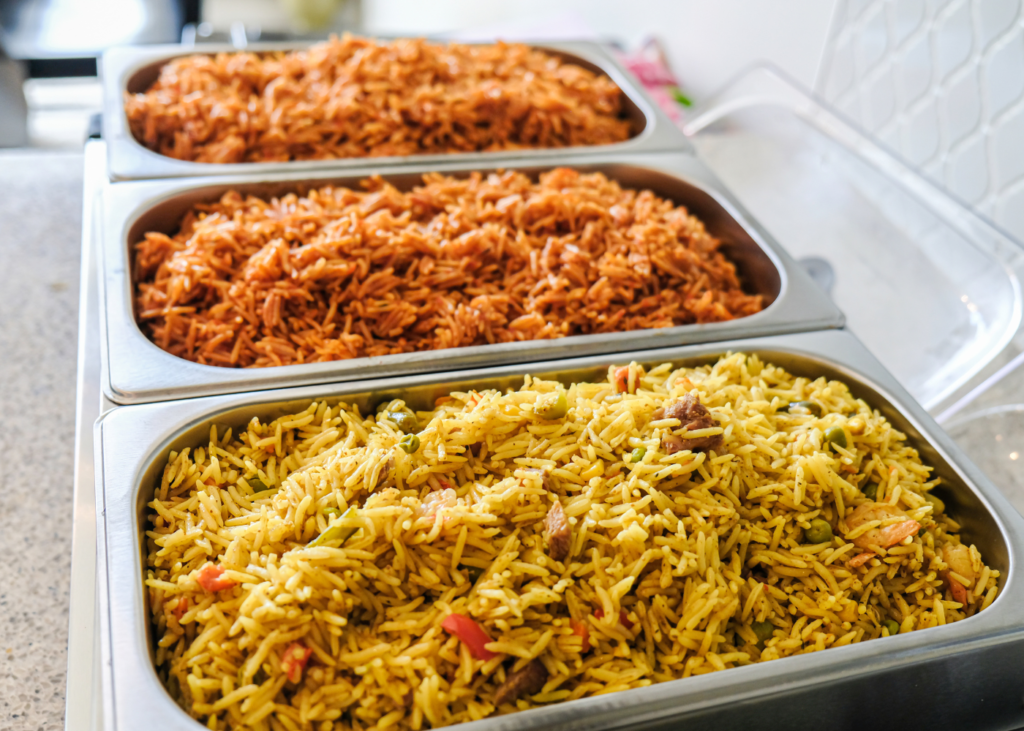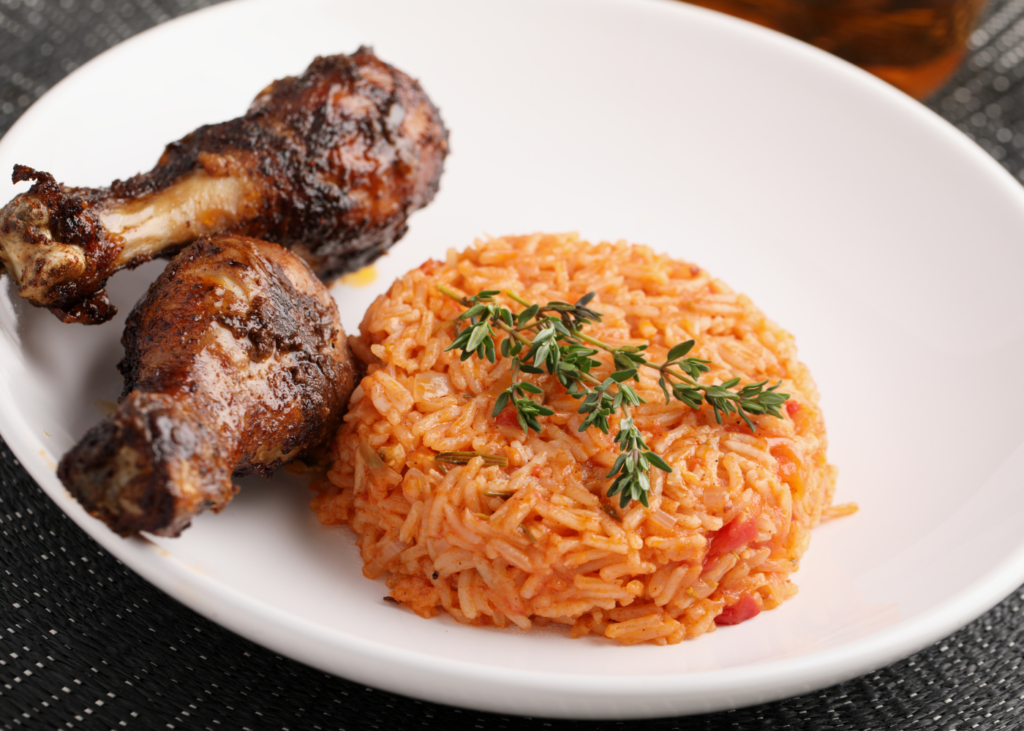How to Start a Jollof Rice Business in Nigeria that Makes 15K Daily
Are you considering starting a Jollof rice business in Nigeria?
If you’ve ever found yourself dreaming about the aromatic flavors of Jollof rice then starting a Jollof rice business might be your calling.
Nigeria is famous for its delicious cuisine, and one dish that stands out is Jollof rice. With its rich flavors and vibrant colors, Jollof rice has become a favorite among Nigerians and even gained international recognition.
I have ventured into various business endeavors over the past seven years. Through these experiences, I have gained valuable insights into the secrets of success in the world of business.
Get your apron on and let me guide you through the step-by-step process of starting your Jollof rice business in Nigeria.
Research and Develop Your Recipe

Jollof rice comes in different versions.
Learn about the flavors, ingredients, and cooking methods used in Jollof rice across Nigeria.
Try different recipes and make your Jollof rice special.
Add your twist that makes it stand out from the rest. You’ll get better as you keep cooking and getting feedback from others.
Find that unique aspect that will make customers choose your Jollof rice over others.
Create a Business Plan
A business plan is important for outlining your objectives, target market, pricing, marketing strategies, and financial projections.
A business plan is your secret weapon. It’s the key to conquering the business world
You will find my full guide on how to create a business plan that succeeds useful.
It will serve as a roadmap for your jollof rice business.
Determine Your Target Market
Identify your target market based on factors such as demographics, location, and preferences.
In short, who are the people going to be patronizing your business?
If you fail to identify your target market you will make a mess of hard work and money.
Consider whether you want to focus on individual customers or families.
Also consider events, catering services, or supplying to restaurants and cafes.
Secure Startup Capital
To get your tasty Jollof rice business up and running, you’ll need some money.
First, calculate the costs for ingredients, kitchen equipment, packaging, marketing, and other initial expenses.
Explore your options: Dip into your savings, consider a loan, or seek out potential investors who believe in your flavorful venture.
Here’s a tip:
If your wallet feels a little light, it’s okay to start small. You can grow your business over time as you gain experience and confidence.
Get creative with your budgeting.
Check Out 7 Instant Loan without BVN in Nigeria
Obtain Necessary Permits and Licenses
Visit the appropriate government agencies to register your business and obtain the required permits and licenses.
These may include food handling permits, health and safety certifications, and tax registration.
Compliance with regulations is essential to ensure a smooth operation or the Ministry of Health and Environment will visit you.
Always ensure that your environment is clean and hygienic to avoid incurring any fines or penalties.
Related Aricles on starting a food business in Nigeria:
- How to Start a Frozen Food Business in Nigeria (The Ultimate Guide)
- How to Start a fast food business in Nigeria that bring in 10k Daily
- How to Start a Food Supply Business in Nigeria and Make Money Fast
- Start a Succesful Restaurant Business in Nigeria in (9) Easy Steps
- How to Start a Frozen Food Business in Nigeria (The Ultimate Guide)
- How To Start Foodstuff Business In Nigeria
Set Up Your Kitchen and Source Ingredients

Find a suitable location for your kitchen.
Whether it’s a commercial space or your home kitchen.
Equip it with the necessary cooking utensils, appliances, and storage facilities. You can easily get most of the equipment at Jumia
Certainly! Here’s a table listing the equipment for starting a jollof rice business:
| Equipment | Description |
| Stove or cooker | A reliable stove or cooker for cooking jollof rice in large quantities. |
| Large cooking pots | Big pots accommodate the quantity of rice you plan to cook. |
| Cooking utensils | Spoons, ladles, knives, and other utensils for preparing and serving the rice. |
| Cutting board | A sturdy cutting board for chopping vegetables, meat, and other ingredients. |
| Kitchen knives | Sharp knives for cutting and slicing ingredients. |
| Food processor or blender | Optional but helpful for blending or processing ingredients. |
| Rice cooker | An efficient rice cooker if you prefer to cook the rice separately. |
| Food storage containers | Containers to store prepped ingredients, leftovers, or packaged servings. |
| Cooling racks | Racks for cooling cooked rice or other items before packaging or serving. |
| Serving trays or plates | Plates or trays to present and serve the jollof rice. |
| Packaging materials | Containers or packaging materials for takeout or delivery orders. |
| Refrigerator or freezer | Storage space for perishable ingredients or cooked rice. |
| Cleaning supplies | Dishwashing liquid, scrub brushes, sponges, and other cleaning supplies for maintenance. |
Make sure to purchase high-quality ingredients from reputable suppliers to ensure the taste and consistency of your jollof rice.
Develop Your Pricing Strategy.
When starting a jollof rice business, pricing is important. Here are some things to think about:
1. Know your costs: Figure out how much it costs to make the jollof rice.
This includes ingredients and other expenses.
Set a price that covers your costs and makes a profit.
2. Understand your customers:
When you’re thinking about selling your jollof rice, it’s important to consider who your target customers will be. In Nigeria, it’s wise to be clear about this.
Take into account their preferences and what they can afford to pay. This will help you determine a price that is suitable for your customers.
3. Consider the competition:
Look at what other people charge for similar food.
This gives you an idea of the prices in the market and helps you decide on a competitive price.
4. Show the value:
If your jollof rice is special or made with high-quality ingredients, it’s only fair to charge a little more.
The truth is, not everyone is your customer, and that’s something you need to understand. Let people know why your jollof rice is worth the price.
5. Try different pricing models:
Set prices based on your costs or on what customers think it’s worth.
You will also find special offers or discounts useful to attract more customers.
Remember to keep an eye on how your pricing is working.
Ask for feedback and make changes if needed.
Note: Pricing is important, but it can be adjusted if it’s not working well.
Establish Your Brand and Market Your Business.
Create a memorable business name, logo, and slogan that reflect the essence of your jollof rice business.
Develop a marketing strategy that includes online and offline channels.
This will include whether or not you plan on delivery.
You will find it useful to run ads, create a website, and collaborate with influencers.
Provide Exceptional Customer Service:
Deliver consistent quality and excellent customer service to build a loyal customer base.
Respond to feedback, address complaints promptly, and constantly improve your product and service offerings based on customer preferences.
Focus on the user experience and everything will turn out great.
Expand and Diversify.
As your jollof rice business grows, think about expanding your menu with other delicious Nigerian dishes, sides, drinks, or snacks.
You can also explore catering opportunities for events.
You will also find it easy to collaborate with other businesses or supply local cafes and restaurants.
Remember, starting a business takes dedication, hard work, and constant learning. Adapt your strategies as you gain experience and feedback from your customers.
FAQs
Is the Jollof Rice Business Lucrative?
Yes, the Jollof rice business is lucrative in Nigeria.
And as Individuals frequently eat out or order food, there is always a consistent demand for Jollof rice.
The business can also cater to events and take advantage of Nigeria’s vibrant social scene.
However, with careful planning and execution, a Jollof rice business in Nigeria has the potential for profitability. You can easily make 15k daily as a profit.
How Much Does It Cost to Start a Jollof Rice Business?

The cost to start a Jollof rice business can range from 150,000 NGN to 5,000,000 NGN.
The specific amount depends on factors such as scale, location, equipment, and operational expenses.
A lower budget would support a small-scale operation, while a higher budget allows for a larger-scale setup with professional equipment, staff, and marketing expenses.
Conducting a thorough business plan and cost analysis is crucial to determine the actual expenses for your specific business model and location.
What Is the Secret Ingredient in Jollof Rice?
One common secret ingredient in Jollof rice is a blend of spices called “Jollof seasoning” which includes spices like thyme, curry powder, garlic powder, onion powder, ginger, and sometimes a hint of nutmeg or cloves.
Additionally, white pepper and butter are often used to add extra flavor and richness to the dish.
What Are the Things Needed for Jollof Rice?

To prepare Jollof rice, you will typically need the following ingredients:
- Rice: The main ingredient, typically long-grain parboiled rice, is commonly used for Jollof rice.
- Protein: This can include chicken, beef, goat meat, or seafood, depending on personal preference. Vegetarian options like tofu or plant-based proteins can also be used.
- Tomatoes: Fresh tomatoes, tomato paste, or canned tomatoes are often used as the base for the Jollof rice sauce.
- Onion: Chopped onions are used for flavoring the dish.
- Peppers: Bell peppers and Scotch bonnet peppers (or other hot peppers) are commonly used to provide a spicy kick. Adjust the quantity based on your preferred level of spiciness.
- Garlic and Ginger: These aromatics add depth of flavor to the Jollof rice sauce.
- Cooking Oil: Vegetable oil or palm oil is typically used for frying and sautéing the ingredients.
- Jollof Seasoning: A blend of spices such as thyme, curry powder, garlic powder, onion powder, and ginger is often used to enhance the flavor.
- Stock or Bouillon Cube: This adds a savory taste to the rice. Vegetable, chicken, or beef stock can be used, or you can use bouillon cubes for convenience.
- Seasonings: Salt, black pepper, and other preferred seasonings are added to taste.
- Vegetables: Optional vegetables such as carrots, peas, green beans, or bell peppers can be added for color and texture.
- Water: This is used for cooking the rice and creating the sauce.
These are the basic ingredients for Jollof rice.
However, variations in the recipe exist, and you can add other ingredients such as bay leaves, thyme, or curry powder to customize the flavor according to your preference.
Conclusion
Starting a Jollof rice business in Nigeria can be a rewarding and profitable venture. You can create a successful business that generates ₦15,000 daily.
Remember, consistency, innovation, and attention to detail will be the keys to your success in the competitive food industry.
Here’s a list of articles I’ve written that will help you find other businesses to start in Nigeria:
- How to Start an Ice Fish Business in Nigeria: A Comprehensive Guide
- 12 Super Tips for Starting a Popcorn Business in Nigeria
- How to Start Keke Spare Parts Business in Nigeria (Tips for Success.)
- How to start a wallpaper business in Nigeria (The Complete Guide)
- How to Start Ice Block Business in Nigeria
- Step-by-Step Guide to Starting a Successful Palm Oil Business in Nigeria
- 11 Essential Steps on How to Start a Provision Store Business in Nigeria

